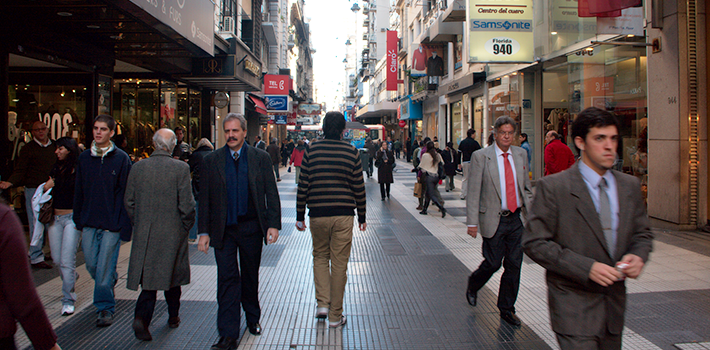Sponsor Says "Blue Dollar" Middlemen Have Infiltrated Enforcement Agency

Argentinean government aims to crack down on blue dollar exchange operators. (Wikimedia)
The Kirchner administration is trying to put an end to the illegal sale of currency, and is working on a bill that would reform current criminal law regarding currency exchange.
Faced with a widening gap between the official and unregulated rates, the bill seeks to change the nature of the offense and allow security forces to conduct raids on black-market exchange “caves,” without a request from the Argentinean Central Bank (BCRA).
Carlos Gonella, chief deputy attorney general for Economic Crime and Money Laundering (Procelac), said the decision to strengthen controls and ease search requirements stems from the discovery of phone records indicating calls placed within the BCRA to illegal businesses, presumably warning them of possible inspections in advance.
Putting an End to “Warning Calls”
Gonellla has described current law governing the black-market exchange “obsolete,” since it gives the BCRA discretion on when and where to conduct raids. He says the law enacted in 1971 is now anachronistic because “it does not cover the blue or parallel dollar.” He also criticized the media for “normalizing the blue dollar.”I have seen armed public officers of various security services providing [private] security for the caves,” Gonella told Radio América. Prosecutors have also told La Nación that during raids police officers often find their colleagues guarding these locations.
One of the highest profile cases to date involves Federal Judge Norberto Oyarbide, who claims he was forced to stop a police raid on an exchange operator after receiving a call from the Legal and Technical Secretariat of the Presidency.
Despite Gonella’s statements, Cabinet Chief Jorge Capitanich dismissed the idea that the administration is working to change the law. “Given my role, [if the bill existed] I would have been aware of it, but that is not the case,” he said. Gonella, however, responded to Capitanich’s comments in an interview with Radio América, once again confirming the proposed legislation and adding that it has been in the works for “several years.”
What the Current Law States
The Criminal Regulations for Foreign Currency Transactions Law was enacted in 1971 during Argentina’s military dictatorship (1966-1973). It provides for sanctions against “any foreign exchange negotiation without the participation of an institution authorized to make such transactions.” It further stipulates that this includes “any foreign exchange transaction not made for the amount, in the currency, at the exchange rate, within the terms established, and according to the remaining provisions established in the regulations in effect.”According to the law, Article 5 states that “the Central Bank of the Argentinean Republic will supervise and control the persons and legal entities negotiating in the exchange market and will conduct the investigations regarding violations of the law.” Paragraph E of the same article explains that it is the BCRA’s exclusive authority to request a search warrant from the courts to “be issued without delay, under the responsibility of the officials who require them.”
The legislation also states that the central bank may “seek the immediate assistance of the police in the case of constraints or resistance when conducting raids, seizures, or inspections of offices, books, papers, correspondence, or documents of the persons under investigation.”
The criminal law sets a financial penalty of up to 10 times the amount of the operation and a maximum prison sentence of eight years for repeat offenses.
Aldo Pignanelli, an economist and public accountant, served as the president of the BCRA between July and December 2002, under the interim government of Eduardo Duhalde. He explained to the PanAm Post that the gap between the blue dollar and official exchange rates stems from the macroeconomic policies of the Kirchner administration. Pignanelli believes that, even though the draft of the bill not yet available, changes to the law will not prevent this gap from widening.
“Amid a run against the peso, and the new Law of Supply, no good will come from a reform of exchange regulations. It’s not about good or bad criminal law, but about having good macroeconomic policy,” said Pignanelli.
No comments:
Post a Comment